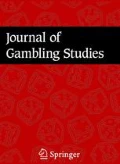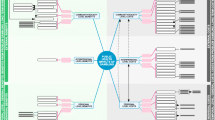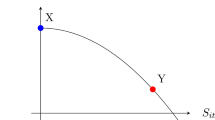Abstract
The appropriate way to classify and measure the “social costs” of gambling is a very important, unresolved methodological issue that has been addressed by Collins and Lapsley (2000); Thompson, Gazel, and Rickman (1999); and Walker and Barnett (1999), among others. What should be included and excluded from social cost studies continues to be a controversial issue, as illustrated in the literature and recent conferences. This paper is an attempt to explain the “economics” conception of social costs in accessible language. By using a simple economic model and everyday examples, it shows that the economics methodology is better than the other methodologies currently available. There are four specific goals of the paper: (1) Discuss the importance of the social cost methodological debate and the state of research in the area; (2) Explain the Walker–Barnett definition of social cost in the context of a simple production possibilities frontier and indifference curve model; (3) Use simple illustrative examples to show why many of the alleged social costs should not be classified as such; and (4) Suggest a new method for analyzing the social costs and effects attributable to pathological gambling.
Similar content being viewed by others
References
Australian Productivity Commission. 1999. Australia's Gambling Industries, Report no. 10, AusInfo, Canberra.
Baumol, W. J., and W. E. Oates. 1988. The theory of environmental policy. New York, NY: Cambridge University Press.
Blaug, M. 1978. Economic theory in retrospect. New York, NY: Cambridge University Press.
Collins, D. and H. Lapsley. 2003. The social costs and benefits of gambling: An introduction to the economic issues. Journal of Gambling Studies, 19, 123-148.
Dixit, A., and G. Grossman. 1984. Directly unproductive prophet-seeking activities. American Economic Review 74, no. 5: 1087-1088.
Eadington, W. R. 2000. Measuring costs from permitted gaming: Concepts and categories in evaluating gambling's consequences. Journal of Gambling Studies, 19, 185-214.
Ekelund, R. B., and R. F. Hébert. 1997. A history of economic theory and method, 4e. New York, NY: McGraw-Hill.
Ferguson, C. E. 1966. Microeconomic theory. Homewood, IL: Richard D. Irwin.
Gazel, R. C., and W. N. Thompson. 1996. Casino gamblers in Illinois: Who are they? UNLV manuscript.
Goodman, R. 1979. The last entrepreneurs: America's regional wars for jobs and dollars. New York, NY: Simon and Schuster.
Goodman, R. 1994. Legalized gambling as a strategy for economic development. Northampton, MA: United States Gambling Study.
Goodman, R. 1995. The luck business: The devastating consequences and broken promises of America's gambling explosion. New York, NY: The Free Press.
Grinols, E. L. 1994a. Bluff or winning hand? Riverboat gambling and regional employment and unemployment. Illinois Business Review 51: 8-11.
Grinols, E. L. 1994b. Testimony and prepared statement. In U.S. House, 8–11 and 71–76.
Grinols, E. L. 1995. Gambling as economic policy: Enumerating why losses exceed gains. Illinois Business Review 52: 6-12.
Grinols, E. L. 1997. Piety and political economy. Paper presented the ASSA conference, Chicago, IL, January 5–6.
Grinols, E. L., and J. D. Omorov. 1996. Development or dreamfield delusions? Assessing casino gambling's costs and benefits. Journal of Law and Commerce 16: 49-87.
Gross, M. 1998. Legal gambling as a strategy for economic development. Economic Development Quarterly 12: 203-213.
Hazlitt, H. 1996 [1946]. Economics in one lesson. San Francisco, CA: Laissez Faire Books.
Henderson, J. H., and R. E. Quandt. 1980. Microeconomic theory: A mathematical approach, 3e. New York, NY: McGraw-Hill.
Heyne, P. N.d. Why does Johnny so rarely learn any economics? N.p.
Hoover, E. M., and F. Giarratani. 1984. An introduction to regional economics, 3e. New York, NY: Alfred A. Knopf.
Kindt, J. W. 1994. The economic impacts of legalized gambling activities. Drake Law Review 43: 51-95.
Kindt, J. W. 1995. U.S. national security and the strategic economic base: The business/economic impacts of the legalization of gambling activities. Saint Louis University Law Journal 39: 567-584.
Krugman, P. R. 1996. Pop internationalism. Cambridge, MA: MIT Press.
McCormick, R. E. 1998. The economic impact of the video poker industry in South Carolina. Report prepared for Collins Entertainment.
National Gambling Impact Study Commission. 1999. Final Report. Washington, DC: U.S. Government.
National Opinion Research Center. 1999. Report to the National Gambling Impact Study Commission. Chicago, IL: University of Chicago.
Pathological Gambling. 1999. Washington, DC: National Academy Press.
Politzer, R. M., J. S. Morrow, and S. B. Leavey. 1985. Report on the cost-benefit/effectiveness of treatment at the Johns Hopkins Center for Pathological Gambling. Journal of Gambling Behavior 1: 131-142.
Ricardo, D. [1817] 1992. Principles of political economy and taxation. Rutland, VT: Charles E. Tuttle Co.
Roberts, R. 2001. The choice: A fable of free trade and protectionism, revised ed. Upper Saddle River, NJ: Prentice Hall.
Ryan, T. P., and J. F. Speyrer. 1999. The impact of gambling in Louisiana. Report prepared for the Louisiana Gaming Control Board. New Orleans, LA: University of New Orleans.
Schumpeter, J. A. [1934] 1993. The theory of economic development. New Burnswick, NJ: Transaction Publishers.
Smith, A. [1776] 1981. An inquiry into the nature and causes of the wealth of nations. Indianapolis, IN: Liberty Classics.
Thompson, W. N. 1996. An economic analysis of a proposal to legalize casino gambling in Ohio: Sometimes the best defense is to NOT take the field. UNLV manuscript.
Thompson, W. N., and R. Gazel. 1996. The monetary impacts of riverboat casino gambling in Illinois. UNLV manuscript.
Thompson, W. N., R. Gazel, and D. Rickman. 1997. Social and legal costs of compulsive gambling. Gaming Law Review 1: 81-89.
Thompson, W. N., R. Gazel, and D. Rickman. 1999. The social costs of gambling: A comparative study of nutmeg and cheese state gamblers. Gaming Research & Review Journal 5: 1-15.
Thompson, W. N., and F. L. Quinn. 2000. The video gaming machines of South Carolina: disappearing soon? Good riddance or bad news? A Socio-economic analysis. Paper presented at the 11th International Conference on Gambling and Risk-Taking, Las Vegas, NV, June 12–16.
Tullock, G. 1967. The welfare costs of tariffs, monopolies, and theft. Western Economic Journal 224-232.
U.S. House of Representatives. 1995. Committee on Small Business. The national impact of casino gambling proliferation.
Vaughan, R. J. 1988. Economists and economic development. Economic Development Quarterly 2: 119-123.
Walker, D. M. 1998. Sin and growth: The effects of legalized gambling on state economic development. Auburn, AL: Auburn University Ph.D. Dissertation.
Walker, D. M. 1999. Legalized casino gambling and the export base theory of economic growth. Gaming Law Review 3: 157-163.
Walker, D. M. 2001. Is professional gambling a directly unproductive profit-seeking (DUP) activity? International Gambling Studies 1: 177-183.
Walker, D. M., and A. H. Barnett. 1999. The social costs of gambling: An economic perspective. Journal of Gambling Studies 15: 181-212.
Walker, D. M., and A. H. Barnett. 1997. The social costs of legalized gambling reconsidered. Paper presented at the 10th International Conference on Gambling and Risk-Taking, Montreal, Quebec, June 1–3.
Zorn, K. 1998. The economic impact of pathological gambling: A review of the literature. Indiana University manuscript.
Author information
Authors and Affiliations
Rights and permissions
About this article
Cite this article
Walker, D.M. Methodological Issues in the Social Cost of Gambling Studies. J Gambl Stud 19, 149–184 (2003). https://doi.org/10.1023/A:1023629331837
Issue Date:
DOI: https://doi.org/10.1023/A:1023629331837




